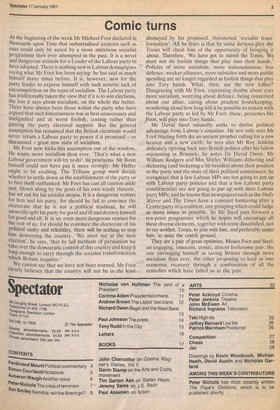Comic turns
At the beginning of the week Mr Michael Foot declared in Newcastle upon Tyne that industrialised societies such as ours could only be saved by a more ambitious socialist programme then ever attempted in the past. It is a novel and dangerous attitude for a Leader of the Labour party to have adopted. There is nothing new in Labour demagogues saying what Mr Foot has been saying: he has said as much himself many times before. It is, however, new for the party leader to express himself with such notable lack of circumspection on the topic of socialism. The Labour party has traditionally taken the view that if it is to win elections, the less it says about socialism, on the whole the better. There have always been those within the party who have argued that such timorousness was at best unnecessary and undignified and at worst foolish, costing rather than gaining the party electoral support. But the general assumption has remained that the British electorate would never return a Labour party to power if it promised — or threatened — great new slabs of socialism.
Mr Foot now kicks this assumption out of the window. He wants more socialism than ever. 'That's what a new Labour government will try to do', he proclaims. Mr Benn himself could not have put it more strongly. Mr Heifer ought to be exulting. The Tribune group must decide whether to settle down as the establishment of the party or to find itself outflanked. Mr Foot has cast all caution aside and, blown along by the gusts of his own windy rhetoric, has set out for his socialist utopia. It is a dangerous venture for him and his party, for should he fail to convince the electorate that he is not a political madman, he will assuredly split his party for good and ill and destroy himself for good and all. It is an even more dangerous venture for the rest of us, for should he convince the electorate of his Political sanity and reliability, there will be nothing to stop him destroying the country. 'We must see at the next election', he says, 'that by full methods of persuasion we take over the democratic control of this country and keep it long enough to carry through the socialist transformation Which Britain requires.' We cannot say that we have not been warned. Mr Foot Clearly believes that the country will not be in the least
"■••■
dismayed by his promised, threatened 'socialist transformation'. All he fears is that by some devious ploy the Tories will cheat him of the opportunity of bringing it about. Therefore, 'We have got to outwit the Tories. We must not do foolish things that play into their hands.' Policies of more socialism, more nationalisation, less defence, weaker alliances, more subsidies and more public spending are no longer regarded as foolish things that play into Tory hands. What, then, are the new follies? Disagreeing with Mr Foot, expressing doubts about ever more socialism, worrying about defence, being concerned about our allies, caring about prudent housekeeping, wondering aloud how long will it be possible to remain with the Labour party as led by Mr Foot: these, presumes Mr Foot, will play into Tory hands.
Mr David Steel naturally seeks to 'derive political advantage from Labour's situation. He not only sees Mr Foot blasting forth ike an ancient prophet calling for a new heaven and a new earth; he sees also Mr Roy Jenkins delicately tiptoing back into British politics after his fallow sojourning in Brussels; he notes Dr David Owen, Mr William Rodgers and Mrs Shirley Williams dithering and dickering (and bickering a bit besides) about their position in the party and the state of their political consciences; he recognises that a few Labour MPs are not going to put up with Labour party policies and that a few Labour party constituencies are not going to put up with their Labour party MPs; and he knows that newspapers such as the Daily Mirror and The Times have a constant hankering after a Centre party or a coalition, any grouping which could fudge as many issues as possible. So Mr Steel puts forward a ten-point programme which he hopes will encourage all these diverse elements, together with some dissatisfied, not to say sodden, Tories, to join with him, and preferably under him, to seize the centre ground.
They are a pair of great optimists, Messrs Foot and Steel: an engaging, innocent, comic, almost frolicsome pair, the one envisaging himself as saving Britain through more socialism than ever, the other proposing to lead us into economic recovery through a combination of all the remedies which have failed us in the past.


































 Previous page
Previous page